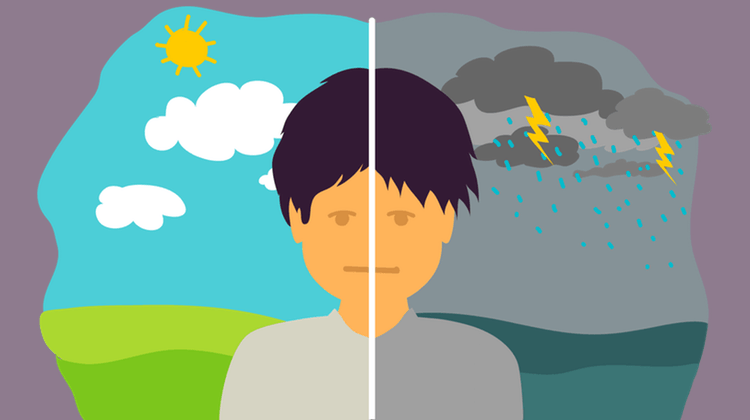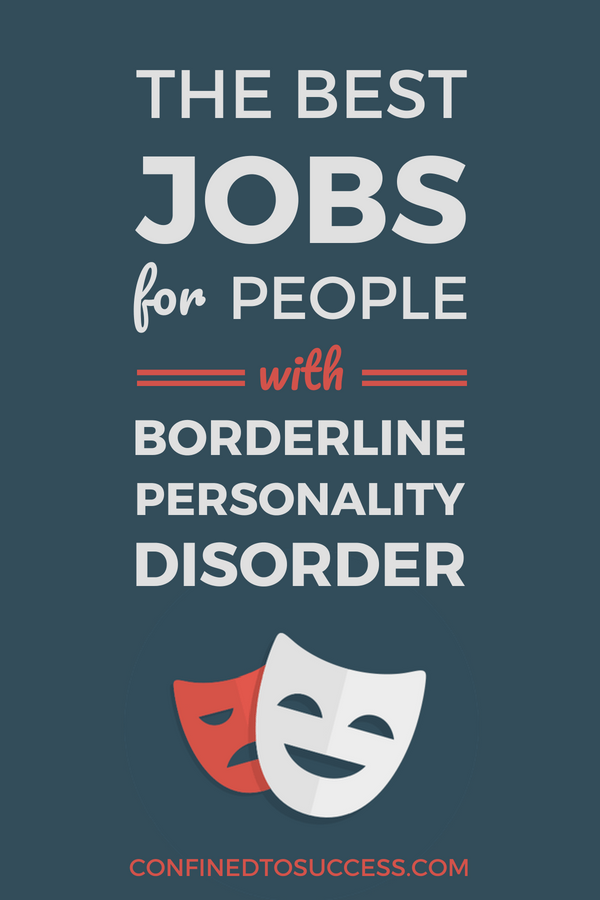Best Jobs For People With Borderline Personality Disorder

Do you float from job to job because you get bored easily or feel like you don’t fit in? Do you find yourself in conflict with your co-workers and have difficulty in personal relationships? Do you feel invisible or feel removed from your own body, just going through the motions of day to day life? If you resonate with symptoms like these, you may be suffering from borderline personality disorder, also known as BPD.
If you’ve been diagnosed with borderline personality disorder, you may sometimes worry how your condition will impact your life, especially when it comes to maintaining a job on a long-term basis. You might also worry about your ability to work with other people when you don’t enjoy working with others.
While the symptoms of BPD can be debilitating, it’s not impossible to find and keep meaningful work. You can go on to have a successful career that gives you a sense of purpose, provides structure, and offers you an amount of social interaction that’s comfortable for you.
WHAT IS BORDERLINE PERSONALITY DISORDER?
Borderline personality disorder (BPD) is a mental illness that affects mood, behavior, and self-image. The disorder can result in problems with your relationships with family members, friends, and loved ones. People with BPD may experience over-the-top, intense emotions that result in impulsive actions, anger, depression, and anxiety. These episodes can last from a few hours to many days or longer. [source]
People with BPD may find it hard to identify where they fit into the world around them. Their interests and goals can change very quickly depending on what triggers their inspiration. BPD sufferers may also tend to view things from an extreme perspective; they’re either black or white, all good or all bad. This behavior of frequently shifting feelings can lead to problems with relationships, making them unstable or intense.
Other signs or symptoms of borderline personality disorder may include:
- Fear of Abandonment – Whether real or imagined, a person with BPD may get into intense relationships too quickly or cut off a relationship abruptly out of fear of being abandoned first.
- Unstable Relationships – Unstable relationships with extreme highs and lows with family, friends, and loved ones.
- Uncertain or Distorted Sense of Self – Identity issues and difficulty finding your place in the world.
- Intense Mood Swings – These mood swings can last from a few hours to a few days.
- Impulsive Behaviors – Drastic or impulsive behavior like unsafe sex, spending large amounts of money, substance abuse, reckless driving, and alcohol abuse.
- Self-Harming – Severe scratching, sticking yourself with needles, or other self-harming behaviors such as cutting or burning in an attempt to manage intense feelings.
- Dissociation – Feelings of dissociation, zoned out, or that you’re not in your own body.
- Feelings of Emptiness or Numbness – Having no feelings at all, akin to a robot or doll.
- Inappropriate Anger – Episodes of rage or inappropriate anger that comes on quickly.
- Difficulty Trusting People – Difficulty with interpreting what may be seemingly innocent behavior as something with malicious intent or negative intentions.
- Suicidal Thoughts – Thoughts or threats of suicide or hopelessness.
What is the Cause of Borderline Personality Disorder?
The cause of borderline personality disorder is not yet known. Some researchers think it may be due to one or more factors such as traumatic events, environmental issues, genetics, brain structure, or infection. Some possible factors in the cause for borderline personality disorder may include:
Family History – There may be a higher risk of developing borderline personality disorder if you have a close family member such as a parent or sibling with the condition.
Neurological Factors – Some studies show that people with BPD have functional and structural changes in the part of their brain that controls emotions and impulses. However, it’s still not known whether these neurological changes are due to having a predetermined risk factor or actually caused by BPD.
External Factors – Non-physiological factors such as social, cultural, or environmental issues may also be a cause for borderline personality disorder. People with this illness often have reported that they experienced traumatic events such as physical or sexual abuse, abandonment, or terrible adversity during their childhood.
WORST WORK CONDITIONS FOR PEOPLE WITH BORDERLINE PERSONALITY DISORDER
People with BPD often face challenges and hardships when it comes to pursuing a job in the traditional workplace. Some individuals may find it difficult to focus on one career path for an extended period and want to move on to something else that peaks their interest at any given time. Others may find it tough to keep up with the social interactions and communication skills with their co-workers.
Some of the worst work conditions that individuals with BPD may face are:
- A high amount of organization
- Remembering many details
- Long hours or weekend work
- An unpredictable schedule
- Requiring lots of social skills
- Ability to multi-task
- Fast-paced environment
WORST JOBS FOR PEOPLE WITH BORDERLINE PERSONALITY DISORDER
Given the work conditions explained above, here are a few jobs most people with borderline personality disorder should probably stay away from:
Customer Service – Having to deal with potentially angry customers on a daily basis can be quite difficult and requires patience and emotions kept in reserve.
Salesperson – For individuals with BPD who are introverts, having the upbeat attitude and aggressiveness that salesmanship requires may be a challenge for someone with minimal social skills.
Teacher – Some people with BPD may find it extremely difficult to stand up in front of a class and try to mask their moods when they’re depressed. Others may have issues with unruly or misbehaving students while trying to teach a class.
Administrative Assistant – Working in a close relationship with an immediate superior may be difficult for those with BPD because of the potential for conflict or misinterpreting their bosses instructions as hostile.
HOW TO COPE WITH BORDERLINE PERSONALITY DISORDER IN THE WORKPLACE
It’s possible to be successful in your workplace even if you have borderline personality disorder. Some ways to cope with the struggles of day-to-day demands include:
- Get Enough Sleep – Getting enough sleep is absolutely essential in trying to maintain any kind of job career. It’s recommended that people with BPD get at least seven to nine hours of sleep every night. Even one night of losing sleep can rapidly derail your feelings of stability.
- Avoid Stressful Situations – Consider learning how to remove yourself from stressful situations before they escalate. Taking a step back to breathe and reevaluate the potential conflict that’s happening may help to de-escalate the tension.
- Don’t Stop Your Meds – Taking the medication prescribed to you by your physician is very important, even if you think they’re not working or you’re feeling better. Before stopping or changing your medication, always consult a medical professional.
- Try Relaxation Exercises – Relaxation techniques like deep breathing, meditation and yoga can be very helpful to maintain some stability in the way you handle stress and interact with other people.
BEST WORK CONDITIONS FOR PEOPLE WITH BORDERLINE PERSONALITY DISORDER
There really is no “best” kind of job for a person with borderline personality disorder. Everyone’s symptoms are different and one career that works for a certain individual may not work at all for another. What’s important is to find a job that works for you.
Consider the things that trigger your instability or depression and try to focus on your strengths and inherent skills. Here are some work conditions you may find beneficial when trying to decide what job might be best for you:
Flexible Hours – Having a job with flexibility can be important if you need to take time off for doctor’s appointments, seeing your therapist, or needing to catch up on sleep.
Work Environment – Consider the job environment that works for you. Some people do better in a quiet space with little stress. Others may enjoy having lots of things happening all at once.
Structured Environment – For some people with BPD, having a job with a specific, structured format may help keep them feeling in control and create less anxiety and stress.
Creativity – Some individuals with BPD thrive when they have an opportunity to be creative. Having a career that involves being creative may keep a person with BPD from getting bored.
BEST JOBS FOR PEOPLE WITH BORDERLINE PERSONALITY DISORDER
Generally, the key to being happy and fulfilled in your career is learning to know your unique self. In order to find the right job, you need to be able to identify your specific personality traits. Spend some time thinking about your interests, skills, and the kinds of personality traits that make you tick.
Giving consideration to your values, limitations/barriers, and how much stamina or strength you have on a given day can also help you decide which career to choose. To this end, here are a few of the best jobs for people with borderline personality disorder:
Business Owner – Starting your own business gives you a lot of flexibility to work around your symptoms and avoid possible conflicts and tension in the workplace (albeit with some level of stress). For example, selling crafts online like making handmade soap or jewelry, on a marketplace like Etsy may be a good fit.
Virtual Jobs – Working as a virtual assistant or taking messages allows you to work when you want and manage how much social interaction you can handle.
Temporary Employment – Working at a temp agency allows you to work in a number of different environments so you don’t get bored. It provides you with stability, but you still have flexibility if you need to change to a new work environment.
Dog Walker – If you love animals, but don’t love people, you might consider being a dog walker. It provides you with a routine, but you don’t have to interact with people as often.
Survey Taker – While not lucrative, online survey taking can be a good way to make an extra couple hundred dollars per month, especially while pursuing other opportunities. Thing is, it can sometimes be tricky telling apart reputable companies from outright scams.
Affiliate Marketing – Based on revenue sharing, affiliate marketing is a great way to make money online and avoid the pitfalls of having to deal with the day-to-day grind of a traditional workplace environment.
CONCLUSION
While the challenges of borderline personality disorder can be daunting, there’s still hope that individuals with this condition can go on to lead a productive and fulfilling life and career. Having a sound strategy gives you lots of flexibility in your schedule and making money in your own time.
NOW IT’S YOUR TURN!
What jobs for people with borderline personality disorder would you recommend? How have you dealt with BPD in the workplace in the past? Leave your comments below!







